
In the Beginning Was the Word - Nathaniel Mackey
Performers
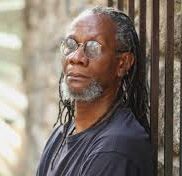
Nathaniel Mackey
See Bio
Born in Miami, Florida, in 1947, a Californian most of his life, and a resident of Durham, North Carolina, since 2010, Nathaniel Mackey is a poet, fiction writer, essayist and editor. He has published numerous books and chapbooks of poetry, most recently Birds Anonymous (Verge, 2023) and Double Trio (New Directions, 2021), a boxed set of three books: Tej Bet, So’s Notice and Nerve Church. He has received such prestigious honors as the National Book Award for Poetry (2006), the Bollingen Prize for American Poetry (2015) and, most recently, the Caribbean Philosophical Association’s Nicolás Cristobál Guillén Batista Lifetime Achievement Award (2024).

Salim Washington
See Bio
Salim Washington is a composer and multi-instrumentalist, playing tenor sax, flute, oboe, and bass clarinet. He has played and recorded with many of the luminaries of the art form, and has been featured in festivals and other venues throughout the United States, Europe, Africa, and Latin America. Washington has combined a life in music with a life of the mind, and is a scholar of black music and culture, having written several articles and co-written with Farah Jasmine Griffin Clawing at the Limits of Cool, a book about the collaboration between Miles Davis and John Coltrane. He currently serves as professor of Global Jazz Studies and Music at UCLA. He works to combine his artistry and pedagogy with his political conviction that we must work to improve our society with greater justice for all.
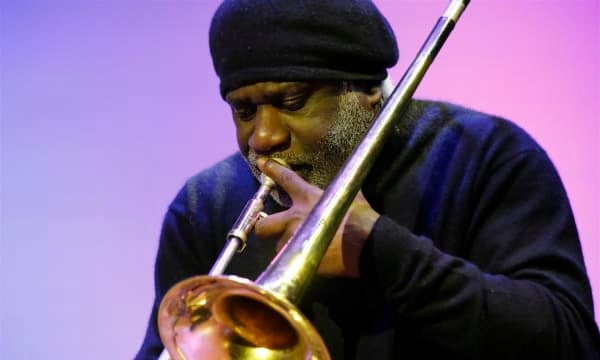
Frank Lacy
See Bio
Hailing from Houston Texas, Ku-umba Frank Lacy started on piano early then switched to brass instruments throughout elementary, junior, and senior high school. He started his professional career at 14 with Joe Tex. He attended an HBCU, Texas Southern University, where he majored in physics. He then moved to Boston in 1979 to attend the Berklee College Of Music, studying arranging, trombone, conducting, and film composition. Moving to NY in 1981 and then attending Rutgers University, he studied physics and music. Deemed as super executive John Hammond’s last “find,” Frank has garnered 5 Grammy awards (2 with Mc Coy Tyner, 1 with Roy Hargrove, 1 with the Mingus Big Band and 1 with D’Angelo). A bandleader in his own right, he’s performed with Slide Hampton, Illinois Jacqu Lester Bowie, Henry Threadgill, Bobby Watson, Julius Hemphill, Art Blakey’s Jazz Messenger ( as musical director), Dizzy Gillespie, the Mingus Big Band, Roy Hargrove, Mc Coy Tyner, Abdullah Ibrahim, D’Angelo, Erykah Badu, Common, and Kid Kudi.
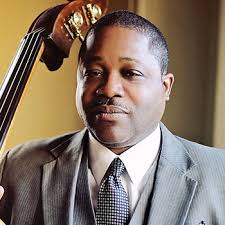
Rodney Whitaker
See Bio
Hailing from Detroit, Michigan, Rodney T. Whitaker is a multifaceted virtuoso. Over four decades, this celebrated artist and pedagogue has championed jazz with fervent devotion, profoundly shaping its landscape. A newly elected member of the prestigious American Academy of Arts and Sciences underscores the impact of this distinguished professor at Michigan State University, who has painstakingly built one of the nation’s foremost blues-based jazz programs. His unwavering commitment and inspiring zeal have nurtured generations of musicians, igniting their passion and guiding their careers with tireless commitment. Beyond his exceptional teaching, Whitaker is a globally celebrated jazz double bassist. His powerful, unmistakable tone commands attention worldwide. He has shared stages with a pantheon of jazz legends, including Ray Charles, Chick Corea, Dizzy Gillespie, Kathleen Battle, Natalie Cole, Dianne Reeves, Marian McPartland, The Marsalis Family, Crosby, Stills, Nash & Young, and many, many others—a constellation of talent that spans generations and styles. This illustrious list also boasts collaborations with leading symphony orchestras across the globe, showcasing the breadth of his artistry. His seven-year stint with Wynton Marsalis’s Septet and the Lincoln Center Jazz Orchestra, as well as his prominent role in the Roy Hargrove Quintet, further solidifies his position as a pivotal figure in contemporary jazz. His performances with such luminaries represent a legacy of musical excellence and profound influence.
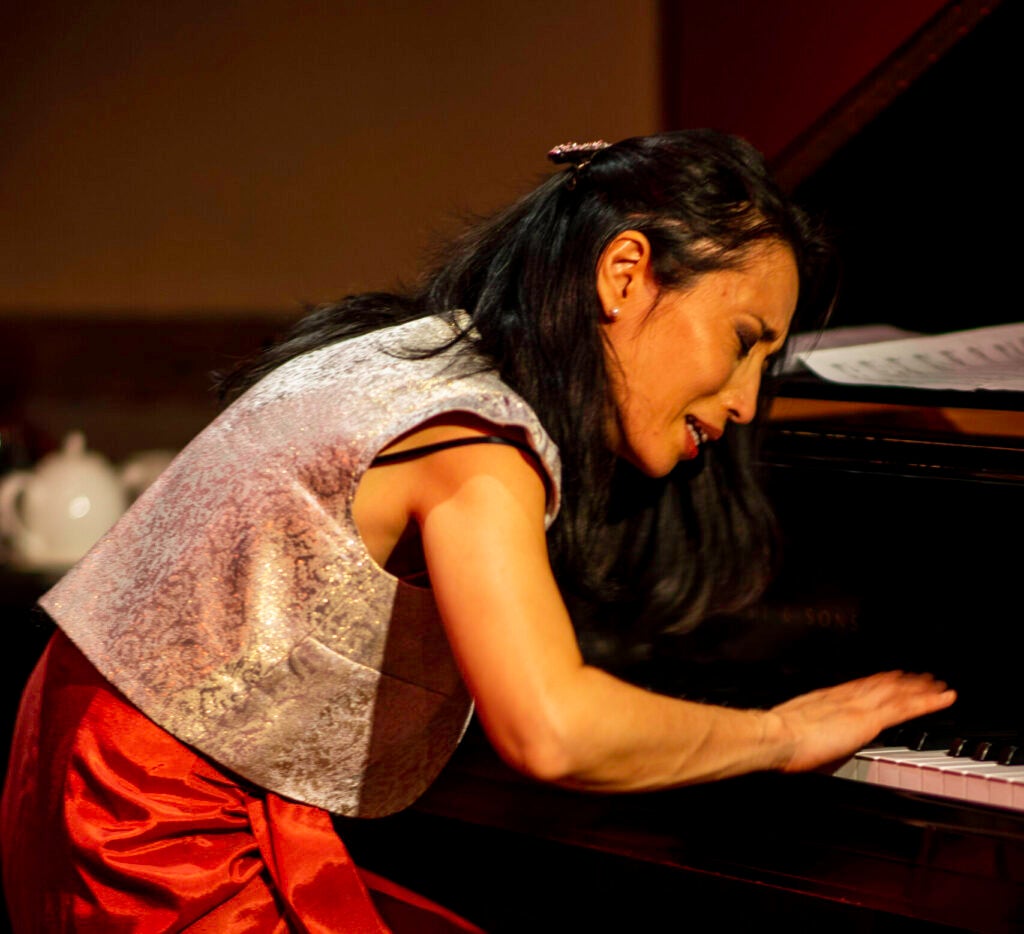
Yayoi Ikawa
See Bio
Born in Tokyo, Japan, but raised musically in New York, pianist/composer Yayoi Ikawa is an experience in ingenuity and compassion. Using music as a powerful communicational tool, Yayoi strives to lift up humanity through understanding and encouraging herself and others. After recording a straight-ahead jazz piano trio on Nippon Crown release “Angel Eyes” in 2004, she self-produced “Color of Dreams” displaying her original compositions. Since then her group has featured in various music festivals in U.S., Italy, Japan, Costa Rica, Guadeloupe, Martinique, South Africa, and Ivory Coast. In 2008, Yayoi started “The Bridge Project” to create musical dialogues between different cultures in concerts and workshops. More of her musical journey can be seen on www.yayoiikawa.net
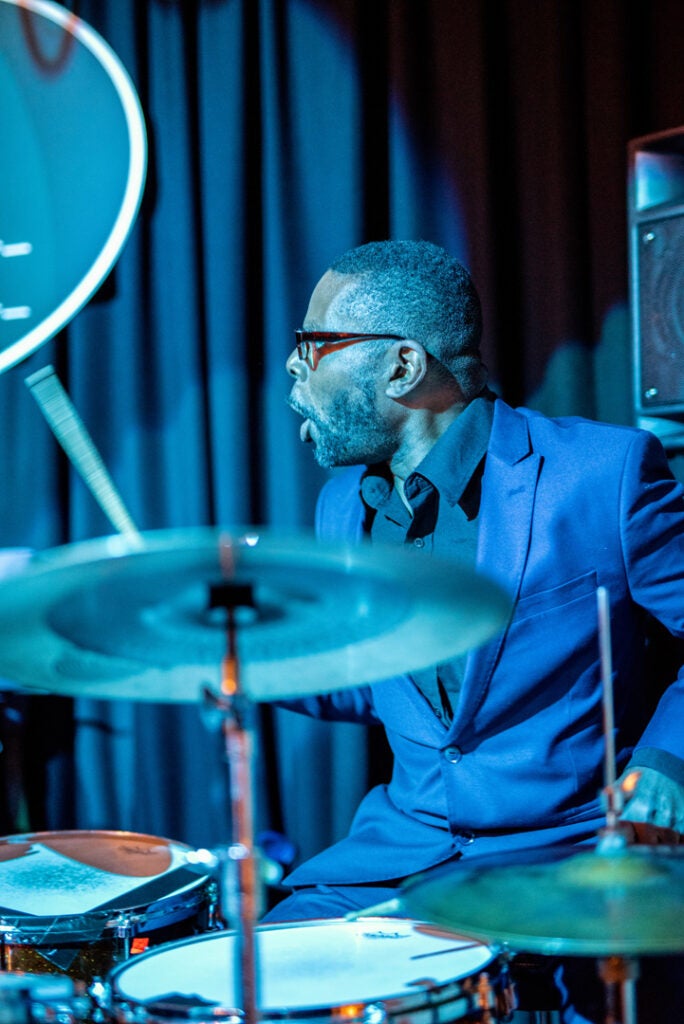
Taru Alexander
See Bio
Taru Alexander is an acclaimed American jazz drummer with over three decades of award-winning experience. Born in Brooklyn, New York, to jazz legend Roland Alexander, Taru was immersed in music from childhood, performing professionally by age 13. He has appeared on over 100 albums, collaborating with jazz greats like Roy Hargrove, Kenny Garrett, and Abbey Lincoln. As a bandleader, his albums “KoJo Time” and “Echoes of the Masters” earned critical praise, including 4 stars in DownBeat Magazine. Honored by Brooklyn’s borough president and lauded for his innovative drumming, Taru remains a dynamic force in jazz, inspiring audiences worldwide.
PROGRAM
“In the Beginning was the Word” is a collaboration between the words/poetry of Nathaniel Mackey and the musical compositions of Salim Washington and features five compositions.
These five compositions all deal with various aspects of love. Five pieces were selected in tribute to Oshun, orisha of love and sweet waters. “Oshun,” “Imililo,” “You Can Fly,” “Beneath the Bridge of Lost Desire,” and “Self-Love/Revolutionary Ontology.”
Compositions
“Oshun” represents godly love. The composition was inspired by Oxum, the Afro Brazilian orisha as she appeared to me in bahia. Depicted are the serene acts of love and eros along with the caprice and energy of the warrior aspects of the orisha.
“Imililo” is Zulu for “Fires” and represents the love of peoples. This piece is in response to the killing and burning of black foreign nationals in South Africa in several violent sprees of what are referred to as xenophobic or afro phobic attacks. While living in South Africa black people were scapegoated and killed, the greatest irony being that often these victims were from the countries that hosted the exiled South African freedom fighters during the apartheid era. “Imililo” is both in protest of the violence and in concert with the suffering of the people. It is a call to love these peoples.
“You Can Fly” is representative of brotherly/sisterly/familial love. In the face of homophobia within my family I write this in support and in love for my sister. The timbre of the oboe, unusual in jazz settings, is deliberately chosen for its graininess and its ability to simultaneously serenade and scratch against its subject.
“Beneath the Bridge of Lost Desire” takes its title from the third and last volume of Samuel Delany’s Neveryóna Series (fourth volume if one counts the “Tales of Neveryóna”), and represents the love that exists and persists at the end of a ‘love affair.’ Neveryóna, on one level a tale of a slave who frees himself and begins a slave rebellion, is also a story about homoerotic desire and sexual domination. Ultimately the series is a meditation on the narrative of civilization, how it is conceived and propagated. The composition deals with the mourning of lost love, but also the ironies inherent in ‘civilization’ and its various dominations and oppressions.
“Self Love/Revolutionary Ontology” is built upon musical motifs that are ergonomically idiomatic to the saxophone. It is multi-thematic and includes music that is personally relevant in the senses that on the one hand employing an unapologetic aesthetic of self, and on the other a courage based upon fundamental musical groundings based upon the seemingly diverse musics of Pharoah Sanders and Charles Mingus. Self Love, however, goes beyond narcissism as it addresses the seemingly taboo arena of black love. That a black subject can achieve what South Africans call ubuntu, or humanity (hence the Zulu proverb umuntu ngumuntu ngabantu—People are people because of other people) is possible through what can be seen as a revolutionary ontology, a being that is predicated upon love and not the residue of loathing and pessimism that the past five centuries have inculcated.
“Coda: After the Rain”